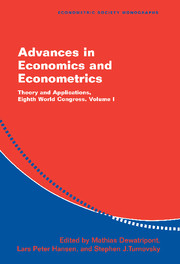Book contents
- Frontmatter
- Contents
- List of Contributors
- Preface
- 1 Auctions and Efficiency
- 2 Why Every Economist Should Learn Some Auction Theory
- 3 Global Games: Theory and Applications
- 4 Testing Contract Theory: A Survey of Some Recent Work
- 5 The Economics of Multidimensional Screening
- A Discussion of the Papers by Pierre-Andre Chiappori and Bernard Salanié and by Jean Charles Rochet and Lars A. Stole
- 6 Theories of Fairness and Reciprocity: Evidence and Economic Applications
- 7 Hyberbolic Discounting and Consumption
- A Discussion of the Papers by Ernest Fehr and Klaus M. Schmidt and by Christopher Harris and David Laibson
- 8 Agglomeration and Market Interaction
- 9 Nonmarket Interactions
- Index
1 - Auctions and Efficiency
Published online by Cambridge University Press: 19 January 2010
- Frontmatter
- Contents
- List of Contributors
- Preface
- 1 Auctions and Efficiency
- 2 Why Every Economist Should Learn Some Auction Theory
- 3 Global Games: Theory and Applications
- 4 Testing Contract Theory: A Survey of Some Recent Work
- 5 The Economics of Multidimensional Screening
- A Discussion of the Papers by Pierre-Andre Chiappori and Bernard Salanié and by Jean Charles Rochet and Lars A. Stole
- 6 Theories of Fairness and Reciprocity: Evidence and Economic Applications
- 7 Hyberbolic Discounting and Consumption
- A Discussion of the Papers by Ernest Fehr and Klaus M. Schmidt and by Christopher Harris and David Laibson
- 8 Agglomeration and Market Interaction
- 9 Nonmarket Interactions
- Index
Summary
INTRODUCTION
The allocation of resources is an all-pervasive theme in economics. Furthermore, the question of whether there exist mechanisms ensuring efficient allocation (i.e., mechanisms that ensure that resources end up in the hands of those who value them most) is of central importance in the discipline. Indeed, the very word “economics” connotes a preoccupation with the issue of efficiency.
But economists' interest in efficiency does not end with the question of existence. If efficient mechanisms can be constructed, we want to know what they look like and to what extent they might resemble institutions used in practice.
Understandably, the question of what will constitute an efficient mechanism has been a major concern of economic theorists going back to Adam Smith. But, the issue is far from just a theoretical one. It is also of considerable practical importance. This is particularly clear when it comes to privatization, the transfer of assets from the state to the private sector.
In the last 15 years or so, we have seen a remarkable flurry of privatizations in Eastern Europe, the former Soviet Union, China, and highly industrialized Western nations, such as the United States, the United Kingdom, and Germany. An important justification for these transfers has been the expectation that they will improve efficiency. But if efficiency is the rationale, an obvious leading question to ask is: “What sorts of transfer mechanisms will best advance this objective?”
One possible and, of course, familiar answer is “the Market.” We know from the First Theorem of Welfare Economics (see Debreu, 1959) that, under certain conditions, the competitive mechanism (the uninhibited exchange and production of goods by buyers and sellers) results in an efficient allocation.
- Type
- Chapter
- Information
- Advances in Economics and EconometricsTheory and Applications, Eighth World Congress, pp. 1 - 24Publisher: Cambridge University PressPrint publication year: 2003
- 10
- Cited by



